|
|
|
Sort Order |
|
|
|
Items / Page
|
|
|
|
|
|
|
| Srl | Item |
| 1 |
ID:
147100


|
|
|
|
|
| Summary/Abstract |
The United States has the best military in the world today, by far. U.S. forces have few, if any, weaknesses, and in many areas—from naval warfare to precision-strike capabilities, to airpower, to intelligence and reconnaissance, to special operations—they play in a totally different league from the militaries of other countries. Nor is this situation likely to change anytime soon, as U.S. defense spending [2] is almost three times as large as that of the United States’ closest competitor, China [3], and accounts for about one-third of all global military expenditures—with another third coming from U.S. allies and partners.
|
|
|
|
|
|
|
|
|
|
|
|
|
|
|
|
| 2 |
ID:
050604
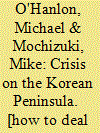

|
|
|
|
|
| Publication |
New York, McGraw-Hill, 2003.
|
| Description |
ix, 230p.
|
| Standard Number |
0071431551
|
|
|
|
|
|
|
|
|
|
|
|
Copies: C:1/I:0,R:0,Q:0
Circulation
| Accession# | Call# | Current Location | Status | Policy | Location |
| 047733 | 355.03305193/OHA 047733 | Main | On Shelf | General | |
|
|
|
|
| 3 |
ID:
064762
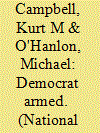

|
|
|
| 4 |
ID:
132148
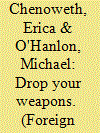

|
|
|
|
|
| Publication |
2014.
|
| Summary/Abstract |
Over the past three years, the world has witnessed a surge of nonviolent resistance movements. Pictures of huge demonstrations in public squares have become a staple of international news broadcasts, and Time named "the protester" as its Person of the Year for 2011. These days, it seems that at any given moment, thousands of people are mobilizing for change somewhere in the world.
|
|
|
|
|
|
|
|
|
|
|
|
|
|
|
|
| 5 |
ID:
190291
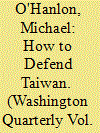

|
|
|
|
|
| Summary/Abstract |
Should the United States commit to defend Taiwan in the event of Chinese attack? Should Washington extend to Taiwan something like NATO’s Article V mutual-defense promise or America’s solemn vow in Article V of the US-Japan Treaty to protect Japan against foreign aggression? Unlike those other treaties, Washington no longer has treaty pledges or any other kind of formal status in its dealings with Taiwan and does not even recognize Taiwan as a country. For four decades, under a policy of “strategic ambiguity,” the United States has refused to tip its hand, declaring instead that any decision on whether to use military power in defense of Taiwan would depend upon how a conflict began. Such deliberate muddying of the deterrence waters has had an unredeeming legacy from Korea to Kuwait and beyond. For Taiwan, however, such a policy has enjoyed support for four decades.
|
|
|
|
|
|
|
|
|
|
|
|
|
|
|
|
| 6 |
ID:
051417


|
|
|
|
|
| Publication |
2004.
|
| Description |
p77-99
|
| Summary/Abstract |
Although the threat of mass casualty terrorism has altered strategic priorities in the United States, the global community as a whole faces many of the same problems that it faced in the 1990s: civil wars; failed or failing states; and other humanitarian disasters around the world. The gap between the demands on the international community to do something about these catastrophes and its ability to respond remains wide. The challenge to create a truly global capacity for peacekeeping and humanitarian intervention is difficult, but not so daunting or expensive as to excuse inaction. With minimal investments, which would primarily entail states shifting military resources and force structures towards more useful ends, superior global capabilities to make a difference are achievable.
|
|
|
|
|
|
|
|
|
|
|
|
|
|
|
|
| 7 |
ID:
065599
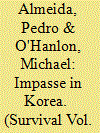

|
|
|
| 8 |
ID:
073802
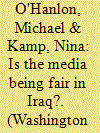

|
|
|
|
|
| Publication |
2006.
|
| Summary/Abstract |
Using original data to systematically assess individual outlets and the media overall, the authors conclude that broad criticism of the U.S. media is often badly overstated.
|
|
|
|
|
|
|
|
|
|
|
|
|
|
|
|
| 9 |
ID:
132152
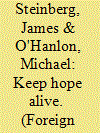

|
|
|
|
|
| Publication |
2014.
|
| Summary/Abstract |
At their summit in California last June, U.S. President Barack Obama and Chinese President Xi Jinping committed themselves to building trust between their countries. Since then, new official forums for communication have been launched (such as the military-to-military dialogues recently announced by the two countries' defense ministers), complementing existing forums such as the Strategic and Economic Dialogue (which features the countries' top diplomats and economic officials). But despite these efforts, trust in both capitals -- and in the countries at large -- remains scarce, and the possibility of an accidental or even intentional conflict between the United States and China seems to be growing. Given the vast potential costs such a conflict would carry for both sides, figuring out how to keep it at bay is among the most important international challenges of the coming years and decades. The factors undermining trust are easy to state. East Asia's security and economic landscape is undergoing massive, tectonic change, driven primarily by China's remarkable economic rise in recent decades. That economic miracle, in turn, has made it possible for China to increase its military capacity and ramp up its political role in the region and beyond. China's leaders and prominent strategists have been at pains to insist that China's rise will be peaceful and poses no threat to its neighbors or the existing international political and economic order. But many members of the world community remain concerned and even skeptical, noting that history and international relations theory are replete with examples of conflict arising from clashes between a dominant and a rising power."
|
|
|
|
|
|
|
|
|
|
|
|
|
|
|
|
| 10 |
ID:
134075
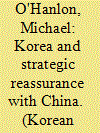

|
|
|
|
|
| Publication |
2014.
|
| Summary/Abstract |
Korea offers not only dangers and risks, but opportunities that could be useful in contributing to a mutual concept of strategic reassurance that Beijing and Washington, along with key U.S. allies like the Republic of Korea, should attempt to introduce into their relationship in a systematic way in the years ahead. The United States has now "rebalanced" toward the Asia-Pacific. But it needs a central organizing concept for what, together with allies, it will do in the region now that it is "back." Coordinating with China about how to handle, cooperatively, any possible major military scenario on the Korean Peninsula as well as the aftermath of any such scenario is a good place to start.
|
|
|
|
|
|
|
|
|
|
|
|
|
|
|
|
| 11 |
ID:
065647
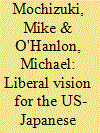

|
|
|
|
|
| Publication |
1998.
|
| Description |
p.127-134
|
|
|
|
|
|
|
|
|
|
|
|
|
|
|
|
| 12 |
ID:
156952
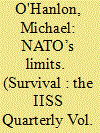

|
|
|
|
|
| Summary/Abstract |
Western relations with Russia are in a dangerous state. In the United States, evidence of Russian meddling in the 2016 election has produced a rare bipartisan consensus of inflexibility towards Moscow. President Donald Trump’s long-stated goal of improved relations is thwarted, not least by the ongoing investigation of possible collusion between his campaign and Russian intelligence agencies. Yet, the goal itself is worthy. After all, Trump’s two immediate predecessors had similar hopes for a better rapport with Russian President Vladimir Putin. Both failed. Putin and many of those around him are hard-edged autocrats, and there will likely be no easy way to put US–Russian relations fully back on track as long as they are in power. But it should be possible to reduce the risks of rivalry and war by focusing on what may be, in Putin’s mind, the fundamental cause of the problem: NATO expansion.
|
|
|
|
|
|
|
|
|
|
|
|
|
|
|
|
| 13 |
ID:
057870
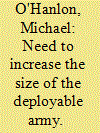

|
|
|
| 14 |
ID:
114720
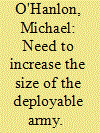

|
|
|
| 15 |
ID:
116615
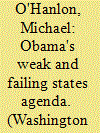

|
|
|
|
|
| Publication |
2012.
|
| Summary/Abstract |
Barack Obama has been a disciplined, pragmatic, and effective president on the urgent national security challenges of the day. His record is generally solid on matters such as managing the nation's major wars, pressuring rogue states, rebalancing the U.S. national security focus toward East Asia, and carrying out the reset policy with Russia. On balance, I would personally rate his foreign policy record through most of his first term as much better than average, with perhaps only George H.W. Bush having done clearly better at this stage among all presidents of the last half century.
|
|
|
|
|
|
|
|
|
|
|
|
|
|
|
|
| 16 |
ID:
115192
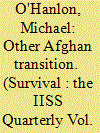

|
|
|
|
|
| Publication |
2012.
|
| Summary/Abstract |
Afghanistan policy debates in NATO capitals these days are about transition. Specifically, by 2014, the NATO-run International Security Assistance Force (ISAF) operation is to end, according to a schedule first proposed by President Hamid Karzai of Afghanistan and later reaffirmed by outside powers at NATO's Lisbon Summit in 2010. By that point, Afghans will have primary security responsibility for all parts of their country - a goal that they will technically reach in 2013, according to the latest plans - and nearly all ISAF troops will be able to depart. The May 2012 strategic partnership agreement between the United States and Afghanistan, reinforced by several other such bilateral accords, will guide relations thereafter; the July 2012 Tokyo donors' conference has added further detail to plans. With these pieces in place, Western policy debates tend to dwell on how fast to bring troops home between now and the end of 2014.
|
|
|
|
|
|
|
|
|
|
|
|
|
|
|
|
| 17 |
ID:
102968


|
|
|
| 18 |
ID:
074310
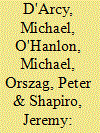

|
|
|
|
|
| Publication |
Washington, Brookings, 2006.
|
| Description |
xiii, 212p.
|
| Standard Number |
0815764596
|
|
|
|
|
|
|
|
|
|
|
|
Copies: C:1/I:0,R:0,Q:0
Circulation
| Accession# | Call# | Current Location | Status | Policy | Location |
| 051818 | 363.32570973/DAR 051818 | Main | On Shelf | General | |
|
|
|
|
| 19 |
ID:
018744
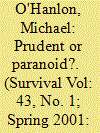

|
|
|
|
|
| Publication |
2001.
|
| Description |
p37-52
|
|
|
|
|
|
|
|
|
|
|
|
|
|
|
|
| 20 |
ID:
081726
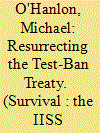

|
|
|
|
|
| Publication |
2008.
|
| Summary/Abstract |
The comprehensive test-ban treaty makes very good strategic sense for the United States and the world. The next American president should build on Bill Clinton's signing of that treaty, as well as George W. Bush's tacit compliance with its strictures, and send it to the US Senate for ratification. It makes sense whether Iran tests its own nuclear weapon in the coming years or not; either way, Washington will need more capacity to apply more pressure on states like Iran, and the treaty could help it garner international support for such pressure. American ratification of the treaty might also be part of a deal by which India and Pakistan agree not to do more testing themselves, joining the United States in a pledge of future restraint.
|
|
|
|
|
|
|
|
|
|
|
|
|
|
|
|
|
|
|
|
|